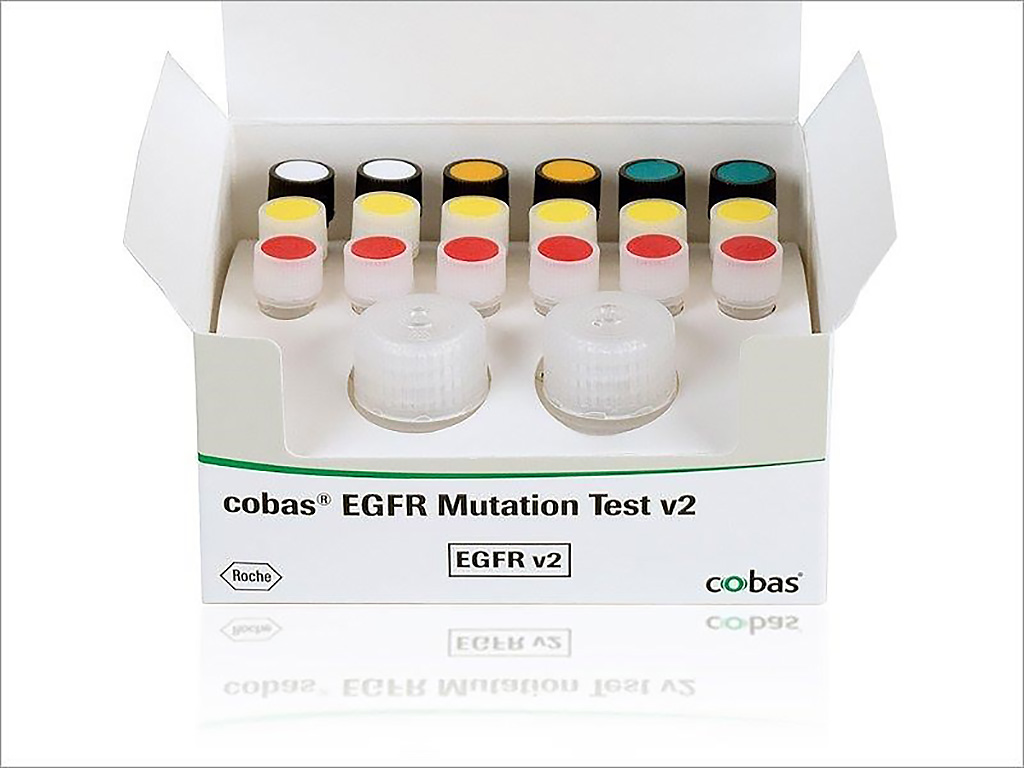Early Prediction of Resistance to Tyrosine Kinase Inhibitors Reported
By LabMedica International staff writers
Posted on 31 Mar 2020
Epidermal growth factor receptor (EGFR) gene mutations that confer sensitivity to tyrosine kinase inhibitors (TKI) in non-small cell lung carcinomas paved the way for a precision medicine approach in this neoplastic form. Posted on 31 Mar 2020
At the time of clinical diagnosis, the detection of EGFR mutations in tumor tissue or circulating tumor DNA (ctDNA), when tissue is unavailable, is mandatory for the selection of patients. A limited number of studies conducted with quantitative of semi-quantitative mutation detection methods have suggested a correlation between the amount of the sensitizing EGFR mutant allele (sEGFRma) in plasma and tumor burden.

Image: The cobas Epidermal Growth Factor Receptor (EGFR) gene Mutation Test v2 (Photo courtesy of Roche).
Oncology specialist at the University of Chieti (Chieti, Italy) and their colleagues tested 116 stage IIIB/IV Non-Small-Cell Lung Cancer (NSCLC) patients, carrying EGFR mutations in their tumors and treated with first/second generation anti-EGFR TKIs, for T790M mutation at clinical progression by liquid biopsy or tumor re-biopsies.
Two blood samples were obtained at each collection, subjected to plasma separation and stored at −80 °C until DNA Extraction. DNA was extracted from the plasma using the cobas cfDNA Sample Preparation kit vers.2 (Roche Molecular Systems, Pleasanton, CA, USA), and recovered in 200 μL of elution buffer. Half of the volume was immediately used for EGFR mutation assessment by the Roche cobas EGFR Mutation Test v2 assay, Polymerase chain reactions (PCR) reactions were run on the Roche cobas z 480 analyzer. An innovative massive parallel sequencing (MPS) approach (SureSelect Cancer All-In-One; Agilent Technologies, Santa Clara, California, USA) was used to optimize the management of the biological material.
The team reported that plasma analysis by the EGFR Cobas test showed in 57 (89%) cases a substantial decrease in the levels of the sensitizing EGFR mutant allele (sEGFRma), down to a non-detectable value. These patients were defined as plasmatic good responders (PGR). In seven (11%) patients, the sEGFRma did not drop to zero (plasmatic poor responders, PPR). In these latter cases, Massive Parallel Sequencing (MPS) analysis at the end of the first month and at clinical progression showed the presence of resistant-inducing mutations, including MET and HER2 gene amplification, KRAS and PIK3CA gene mutations. PPR showed disease progression in five (71%) cases, stable disease in two (29%) cases, and a shorter median Progression-free survival (PFS) (4.3 ± 1.1 months) than that observed in PGR (13.3 ± 1.2 months).
The authors concluded that their results indicate that a subset of NSCLC patients subjected to second-line treatment with osimertinib are resistant to treatment due to the presence of different types of mutations. Plasma monitoring by a simple RT-PCR-based EGFR mutation test in the first month of treatment may be useful to rapidly identify these cases and subject them to MPS analysis for further characterization and treatment. The study was published on March 17, 2020 in the journal Oncotarget.
Related Links:
University of Chieti
Roche Molecular Systems
Agilent Technologies














